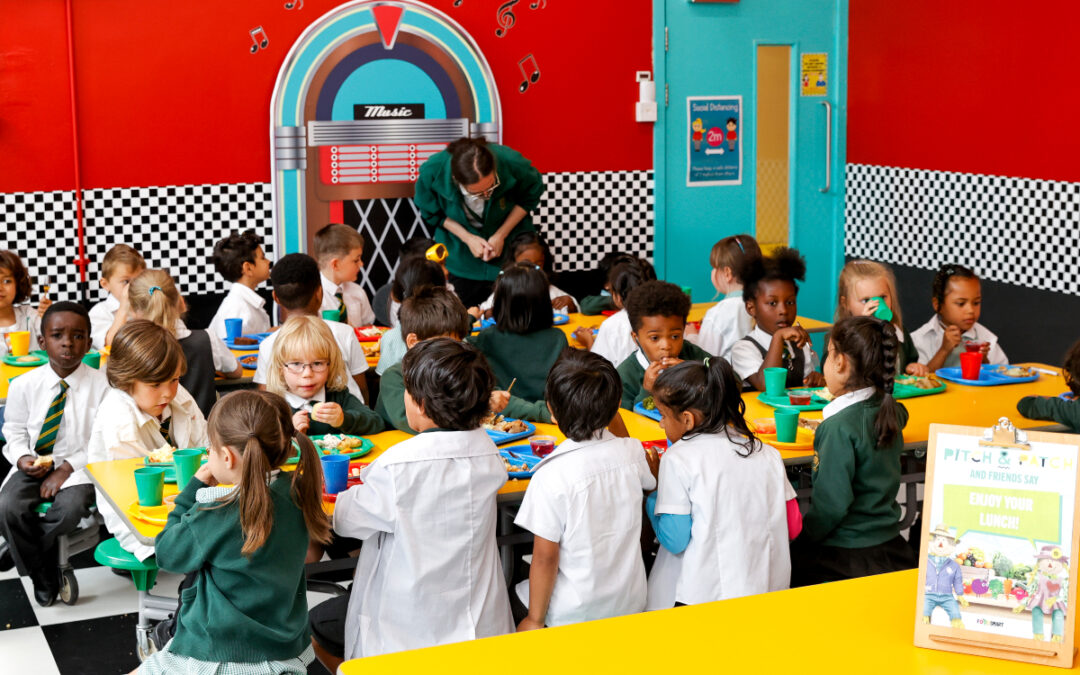A child’s relationship with food starts young, and school meals play a crucial role in shaping it. With childhood obesity and poor nutrition on the rise, it is important to explore how tasty and nutritious meals can help pupils develop a positive relationship with food and set them up for a healthier future.
School Meals: Fueling More Than Just the Body
School meals are about more than just a midday break; they are essential building blocks for a child’s development. Balanced and nutritious meals from schools address several key aspects of growth and well-being:
- Nutritional Benefits: School meals are designed to provide essential nutrients for growth and cognitive development and can improve children’s health and academic performance by:
- Promoting healthy eating habits through adequate intake of fruits, vegetables, and whole grains.
- Delivering essential vitamins and minerals like calcium, iron, and Vitamin D for bone growth and brain function.
- Supporting concentration, memory, and overall mental performance through a balanced diet.
- Research indicates that children in school meal programmes are less likely to suffer from nutrient deficiencies and more likely to make healthy food choices throughout their lives.
- Social Interaction: School meals offer valuable opportunities for social interaction. Sitting together allows children to build social skills and relationships. These interactions are crucial for emotional health and fostering a sense of belonging among peers. During meals, children learn:
- Sharing and taking turns.
- Communication and self-expression.
- Practising manners and etiquette.
- The communal aspect of sharing meals encourages children to try new foods and appreciate diverse cuisines, fostering a friendly and inclusive school environment.
- Educational Opportunities: Schools can integrate nutritional education into meal programs, teaching children about different food groups and healthy choices. Educational opportunities could include:
- Interactive lessons: Health and nutrition lessons incorporated into the curriculum.
- Hands-on activities: Cooking classes or gardening projects to make learning about food fun and engaging.
By educating children about nutrition, schools empower them to make informed food choices now and in the future. It is also believed that kids who understand the importance of a balanced diet are more likely to carry those habits into adulthood.
Building a Positive Relationship with Food Through School Meals
Developing a healthy relationship with food is essential for a child’s growth. School meals can play a pivotal role in this process:
- Exposure to Diverse Foods: Introducing children to a variety of foods and cuisines is crucial for developing their palate and encouraging healthy eating habits. Tasting different foods makes children more open to trying new things, leading to a wider range of nutrients in their diet. Benefits of diverse food exposure include:
- Nutritional Variety: Experiencing and understanding the nutritional benefits of different food groups.
- Cultural Awareness: Sampling foods from other cultures fosters appreciation and open-mindedness about different traditions.
- Adventurous Eaters: Children who try diverse foods at a young age are more likely to continue these habits into adulthood.
Creating a Positive Eating Environment
The atmosphere in which children eat significantly influences their eating behaviours. A pleasant and inclusive dining environment can foster a positive relationship with food:
- Clean and Inviting Spaces: A tidy and welcoming dining area makes meal times more enjoyable.
- Social Interactions: Allowing children to sit and eat with friends promotes social bonds and makes mealtimes fun.
- Positive Role Models: Staff and older students can demonstrate good eating habits and table manners.
- A positive dining environment makes meal times more enjoyable and encourages children to focus on their food and the eating experience, rather than rushing through their meals.
Investing in a Healthy Future
School meals are a critical foundation for developing a positive relationship with food among pupils. By offering nutritious and balanced meals, schools can support physical and cognitive development, encourage healthier eating habits, and foster social and educational growth. Exposure to a variety of foods through school meal programmes allows children to broaden their palate and appreciate different cuisines, promoting cultural awareness and adventurous eating.
For schools, prioritising diverse and healthy meal programmes is not just about addressing immediate nutritional needs. These initiatives lay the groundwork for lifelong positive eating behaviours, setting children up for a healthier and happier future.
Transforming school meals with AiP
With over 20 years of experience and having served more than 400 educational institutions, AiP believes that delicious food can spark meaningful conversations. It helps children appreciate their meals and learn about different cultures. Our food can dispel myths, correct misunderstandings, highlight similarities, and promote tolerance.
The dining hall is an ideal place for nurturing an understanding of diversity. We provide tailored on-site and off-site catering solutions to meet the unique needs of your school. Our meals are balanced, nutritious, and bursting with flavour, consistently surpassing government food standards. Our commitment to digital innovation and sustainability ensures both operational efficiency and environmental responsibility.
We aim to encourage children to explore new foods and enjoy their eating experiences. This is why our menus are crafted by our expert food development teams in collaboration with leading nutritionists. Throughout the academic year, we offer chef-led workshops such as pizza-making, bread-making, and sugar swap classes, providing students with hands-on culinary experiences.
We are committed to using only local, fresh ingredients in our catering services. This includes meat from British farms, seasonal vegetables, and free-range eggs.
To learn more about how we can help enhance your school’s meal programme visit the link https://www.allianceinpartnership.co.uk/contact-us/
